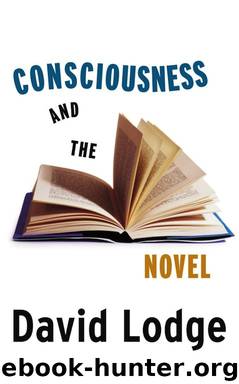Consciousness and the Novel by David Lodge

Author:David Lodge [David Lodge]
Language: eng
Format: epub
Publisher: Random House
Published: 2002-11-06T16:00:00+00:00
Furthermore, Forster grafted onto the form of the well-made traditional novel a subtle use of symbolic patterning, the repetition-with-variation of resonant phrases and images, which he himself called, in his Aspects of the Novel (1927), “pattern and rhythm.”18 Another critic has called this technique “spatial form,” and identified it as a key characteristic of modernist literature.19 The combination of traditional and modern elements in Forster’s fictional technique is signalled by his naming, as the novelists from whom he had learned most, Jane Austen and Marcel Proust.20 The first name is no surprise; the second perhaps is, until we read what Forster has to say about the quasi-musical structure of A la recherche du temps perdu in Aspects of the Novel.
As an example of Forster’s fictional technique in Howards End we might look at chapter 11, about Mrs. Wilcox’s funeral and its aftermath. It begins with an authorial descriptive passage. “The funeral was over. The carriages had rolled away through the soft mud, and only the poor remained” (see here). We could be reading George Eliot—or Thomas Hardy, as the narrator goes on to describe the reactions of the local country people, and then adopts the point of view of one of them, a woodcutter pollarding the elms overlooking the churchyard. The woodcutter’s thoughts convey the traditional, semi-pagan, in-tune-with-nature response to death, which soon gives way to a renewed commitment to life, as he goes off to “mate,” stealing a chrysanthemum from the graveside for his girl. Then follows an authorial description of the deserted churchyard at night: “Clouds drifted over it from the west; or the church may have been a ship, high-prowed, steering with all its company towards infinity” (see here). This metaphor, which has a purely descriptive function here, is recalled for a serious thematic purpose in a crucial passage much later in the novel, in chapter 19. That chapter begins with Margaret and her companions standing on the ridge of the Purbeck hills with the south of England spread out before them, and ends with Margaret and Helen arguing about the differences between their values and those of the Wilcoxes. The authorial voice sums up:
England . . . For what end are her fair complexities, her changes of soil, her sinuous coast? Does she belong to those who have moulded her and made her feared by other lands, or to those who have added nothing to her power, but have somehow seen her, seen the whole island at once, lying as a jewel in a silver sea, sailing as a ship of souls, with all the brave world’s fleet accompanying her towards eternity? (see here)
Download
This site does not store any files on its server. We only index and link to content provided by other sites. Please contact the content providers to delete copyright contents if any and email us, we'll remove relevant links or contents immediately.
| Booksellers & Bookselling | General |
| History of Books |
4 3 2 1: A Novel by Paul Auster(11047)
The handmaid's tale by Margaret Atwood(6852)
Giovanni's Room by James Baldwin(5877)
Big Magic: Creative Living Beyond Fear by Elizabeth Gilbert(4723)
Asking the Right Questions: A Guide to Critical Thinking by M. Neil Browne & Stuart M. Keeley(4574)
On Writing A Memoir of the Craft by Stephen King(4213)
Ego Is the Enemy by Ryan Holiday(3991)
Ken Follett - World without end by Ken Follett(3972)
The Body: A Guide for Occupants by Bill Bryson(3800)
Bluets by Maggie Nelson(3709)
Adulting by Kelly Williams Brown(3669)
Guilty Pleasures by Laurell K Hamilton(3586)
Eat That Frog! by Brian Tracy(3513)
White Noise - A Novel by Don DeLillo(3434)
The Poetry of Pablo Neruda by Pablo Neruda(3366)
Alive: The Story of the Andes Survivors by Piers Paul Read(3310)
The Bookshop by Penelope Fitzgerald(3225)
The Book of Joy by Dalai Lama(3217)
Fingerprints of the Gods by Graham Hancock(3211)
